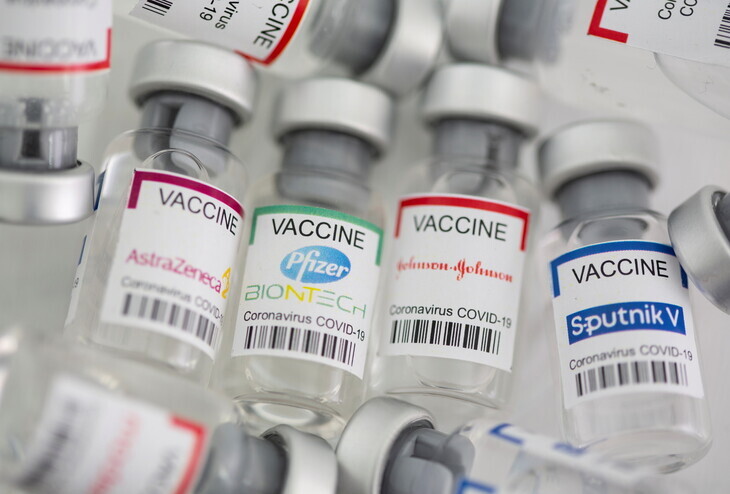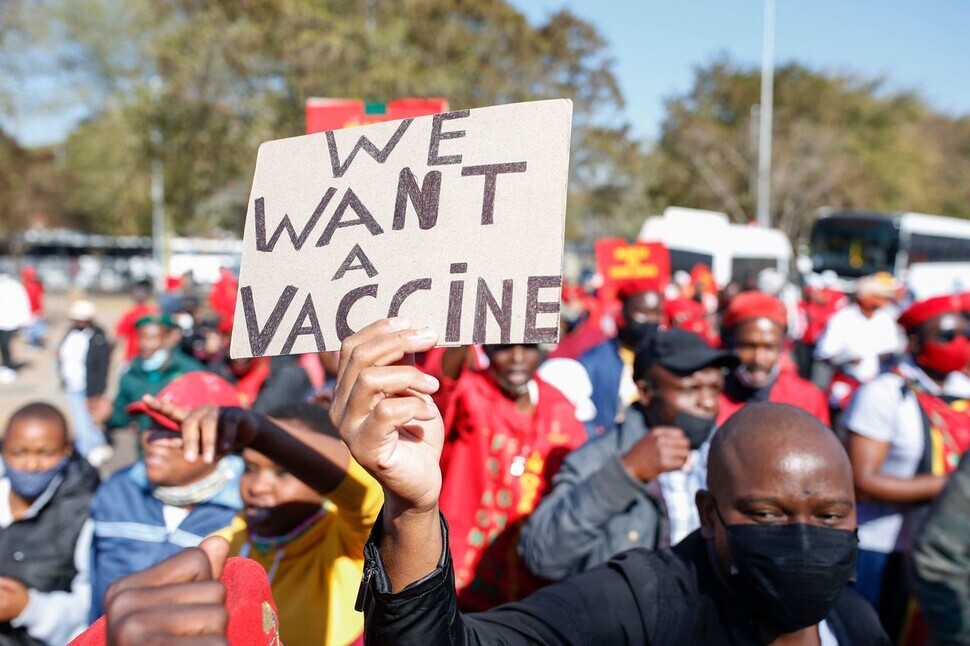hankyoreh
Links to other country sites 다른 나라 사이트 링크
[Column] Can booster shots save humanity from COVID-19?

Back in April, the countries at the front of the vaccine race were filled with hope for an escape from COVID-19. Inoculations were proceeding quickly, and confirmed case numbers were markedly dropping.
Here in South Korea, the media were publishing all sorts of articles about how the "vaccine-wealthy" countries were returning to everyday life. "UK sparks envy as vaccines offer return to daily life," read one headline. "Large-scale gatherings without masks: UK and Israel experiment with return to daily life," said another, while others reported "cheers among the major vaccine powers."
But while that was going on, the seeds of suffering to come were sprouting in India.
The sign came in mid-March when confirmed case numbers there began skyrocketing. By April, the daily new caseload was up to 100,000, signaling that a new variant had finally arrived. It was the Delta variant — the one that is currently sweeping the globe.
Even at the time, experts had been warning that it was meaningless for any one country to declare the pandemic "over." New variants could emerge at any time in places where the virus was rampant, they said.
But the vaccine-wealthy nations were too busy popping champagne bottles.
It didn't take very long at all for the warnings to become a reality. Globally, daily confirmed case numbers fell to the 200,000–400,000 range by mid-June, only to begin climbing again toward the end of the month. Recently, they've been hovering in the 600,000–800,000 range.
The US and other "vaccine-wealthy" countries have not been spared. Apart from the UK, most others have been walking back their "return to daily life" measures by requiring masks and imposing other restrictions.
The pandemic looks a bit different this time around. The reason is that it is overwhelming the unvaccinated who are bearing the brunt.
In the US, where around 50% of the population has received their second vaccine dose, 99% of new confirmed cases and deaths have been among unvaccinated people.
The exceptionally transmissible Delta variant has been ripping into the unvaccinated with frightening force. The Bloomberg Vaccine Tracker, which shows the state of the global vaccine race, referred to the current situation as a "pandemic of the unvaccinated."
It's a situation that calls our attention once again to the severity of vaccine inequality. Those without the weapons to fight the virus are helpless against it.
We see a clear example of this in the steep recent rises in confirmed cases and deaths in Africa and the Western Pacific region, where vaccination rates are low.
According to the global statistics site Our World in Data, only 29 countries around the world have full vaccination rates of 60% of their population or higher; 19 countries have rates of less than 1%. In North America and Europe, 52% of people have received at least one vaccine dose. In Africa, the rate is 4.3%.

The spread of the Delta variant has only underscored the need for vaccines, but that means that relieving vaccine equality could become even more difficult. That's because the vaccine-wealthy countries are now poised to lock the vaccine shed to ensure booster shots for their own publics.
This is why World Health Organization (WHO) Director-General Tedros Adhanom Ghebreyesus sent a message early this month urging those countries to suspend their booster shot plans at least until late September.
"We cannot accept countries that have already used most of the global supply of vaccines using even more of it, while the world's most vulnerable people remain unprotected," he said.
Despite his appeal, the wealthy countries appear to have no intention of letting go of their vaccine nationalism. It is as though the pandemic began and ended within their own borders.
Israel has already begun administering boosters. The US, the UK, Germany and France all plan to start next month. The previous pledges to donate remaining vaccines once their publics have been sufficiently inoculated appear very likely to fall by the wayside.
The surest way to relieve vaccine inequality would be to suspend intellectual property rights for vaccines, allowing for a massive increase in production and guaranteeing fair access. But the wealthy countries are opposing even this in order to ensure profits for their own pharmaceutical companies.
"Every person for themselves" cannot be a fundamental solution for a global disaster like this pandemic. There is a very real possibility that another variant — one even stronger than Delta — could emerge from Africa or other regions where the virus is raging.
The likelihood of that new variant remaining confirmed to that region is nil. Borders mean nothing to a virus.
A few days ago, the British newspaper The Guardian quoted infectious disease experts as warning that the emergence of a new vaccine-evading variant was a "realistic possibility" that could "set us back a year" in the battle against the pandemic.
In November 2020, the G20 leaders issued a declaration in which they agreed to "recognize the role of extensive immunization as a global public good."
If they continue to ignore that commitment, humankind may find itself condemned to the punishment of Sisyphus for some time, as we end up in a repeated cycle of new variants and new waves.
By Lee Jong-kyu, editorial writer
Please direct comments or questions to [english@hani.co.kr]

Editorial・opinion
![[Column] Season 2 of special prosecutor probe may be coming to Korea soon [Column] Season 2 of special prosecutor probe may be coming to Korea soon](https://flexible.img.hani.co.kr/flexible/normal/500/300/imgdb/original/2024/0426/3317141030699447.jpg) [Column] Season 2 of special prosecutor probe may be coming to Korea soon
[Column] Season 2 of special prosecutor probe may be coming to Korea soon![[Column] Park Geun-hye déjà vu in Yoon Suk-yeol [Column] Park Geun-hye déjà vu in Yoon Suk-yeol](https://flexible.img.hani.co.kr/flexible/normal/500/300/imgdb/original/2024/0424/651713945113788.jpg) [Column] Park Geun-hye déjà vu in Yoon Suk-yeol
[Column] Park Geun-hye déjà vu in Yoon Suk-yeol- [Editorial] New weight of N. Korea’s nuclear threats makes dialogue all the more urgent
- [Guest essay] The real reason Korea’s new right wants to dub Rhee a founding father
- [Column] ‘Choson’: Is it time we start referring to N. Korea in its own terms?
- [Editorial] Japan’s rewriting of history with Korea has gone too far
- [Column] The president’s questionable capacity for dialogue
- [Column] Are chaebol firms just pizza pies for families to divvy up as they please?
- [Column] Has Korea, too, crossed the Rubicon on China?
- [Correspondent’s column] In Japan’s alliance with US, echoes of its past alliances with UK
Most viewed articles
- 1Is Japan about to snatch control of Line messenger from Korea’s Naver?
- 2[News analysis] Using lure of fame, K-entertainment agency bigwigs sexually prey on young trainees
- 3[Column] Park Geun-hye déjà vu in Yoon Suk-yeol
- 4Will NewJeans end up collateral damage in internal feud at K-pop juggernaut Hybe?
- 5‘We must say no’: Seoul defense chief on Korean, USFK involvement in hypothetical Taiwan crisis
- 6[Column] The clock is ticking for Korea’s first lady
- 7[Column] Season 2 of special prosecutor probe may be coming to Korea soon
- 8Korea’s 1.3% growth in Q1 signals ‘textbook’ return to growth, says government
- 9Division commander ordered troops to enter raging flood waters before Marine died, survivor says
- 10Report reveals toxic pollution at numerous USFK bases